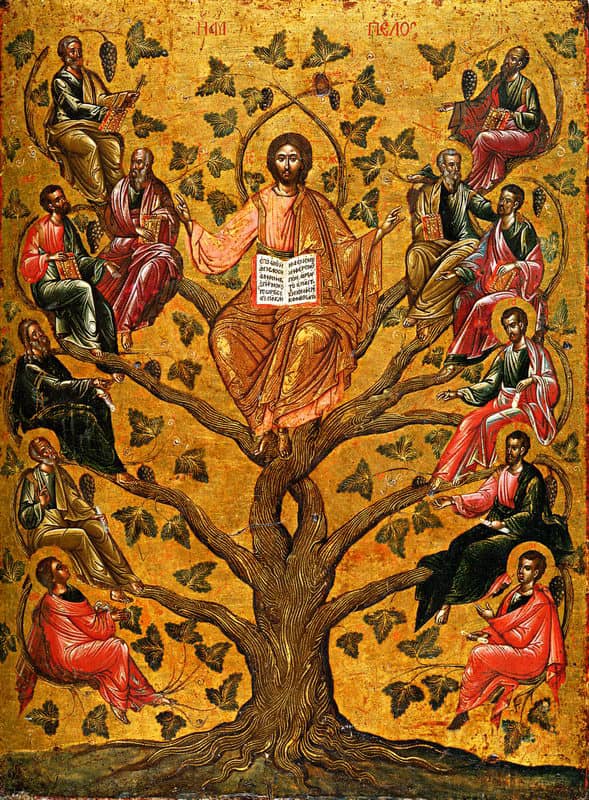 Gospel of 8 July 2020
Gospel of 8 July 2020
Wednesday of the Fourteenth Week in Ordinary Time
Matthew 10:1-7
'Go to the lost sheep of the House of Israel'
Jesus summoned his twelve disciples, and gave them authority over unclean spirits with power to cast them out and to cure all kinds of diseases and sickness.
These are the names of the twelve apostles: first, Simon who is called Peter, and his brother Andrew; James the son of Zebedee, and his brother John; Philip and Bartholomew; Thomas, and Matthew the tax collector; James the son of Alphaeus, and Thaddaeus; Simon the Zealot and Judas Iscariot, the one who was to betray him. These twelve Jesus sent out, instructing them as follows:
‘Do not turn your steps to pagan territory, and do not enter any Samaritan town; go rather to the lost sheep of the House of Israel. And as you go, proclaim that the kingdom of heaven is close at hand.’
Reflexion
Perhaps the most famous name in recent times, a name which has reverberated throughout the world due to wide media coverage and angry protests, is “George Floyd.” Before his untimely death at the hands of the police, no one would have known his name apart from his family and friends. But the reform movement that grew to massive proportions in the aftermath of his death, has catapulted his fame beyond that familiar circle. In fact, his name became part of a familiar two part rallying cry of the protesters, “Say his name!” “George Floyd.”
It’s interesting how, just over a month after his death, people are already starting to forget. The rallying cries have changed. It’s no longer about George Floyd. In fact, the speaker of the US House of Representatives embarrassed herself by calling him “George Kirby” on live television whilst announcing an eponymous police reform bill in his memory. This gives you the impression that names are not really that important except when it suits your political agenda.
Today, we are given the names of the Twelve Apostles. These twelve were not just nameless anonymous individuals but real persons with names. Their names are so important that they are remembered in a list which appears slightly differently in all three synoptic gospels. Though the Fourth Gospel does not possess a list, several of those names are mentioned in its narration.
Names matter. For Catholics who see all of reality as replete with meaning, it is all the more so! The Catechism tells us, “God calls each one by name. Everyone’s name is sacred. The name is the icon of the person. It demands respect as a sign of the dignity of the one who bears it” (CCC 2158). Parents be careful how you name your children! You can either empower them with a zeal to live up to their saint’s name or you can shame them with some trivial ideological moniker or celebrity’s name, and subject them to ridicule for the rest of their lives.
While postmodern existence would seek to rob us of this awareness of the rich meaning all around us, it can be helpful to look back and be reminded of what men believed in times past. Often, these beliefs were anything but primitive superstition. They filled the human experience with beauty, colour, depth and mystery… in short, with love. How one chooses a name reflects that love - love for God, love for the Saint, love for the child.
It is essential to remember the names of these Twelve, on whom our Lord laid the foundation of His Church, the New Israel. It is important to remember that the Church was built on the living testimony of these historical individuals, with all their flaws and foibles. A reminder that our Church is not just the by-product of the “imagination” of early Christians, as many moderns would like to say. The apostles were no mythical figures. When moderns claim that they are trying to “re-imagine” institutions like family, government, religion, don’t believe them for a second. They are just merely reinventing a history that didn’t really take place, or are attempting to build something “new” which will never exist. Now, that’s a myth!
No. Our Lord Jesus Christ, the Word Incarnate, is real. How do we know? We have the testimony of these twelve men. They were real men. Even though one betrayed Him, we will remember them all. Even the blackest smudge on the white sheet has something to teach us. So say their names: “Simon who is called Peter, and his brother Andrew; James the son of Zebedee, and his brother John; Philip and Bartholomew; Thomas, and Matthew the tax collector; James the son of Alphaeus, and Thaddaeus; Simon the Zealot and Judas Iscariot, the one who was to betray him. “
